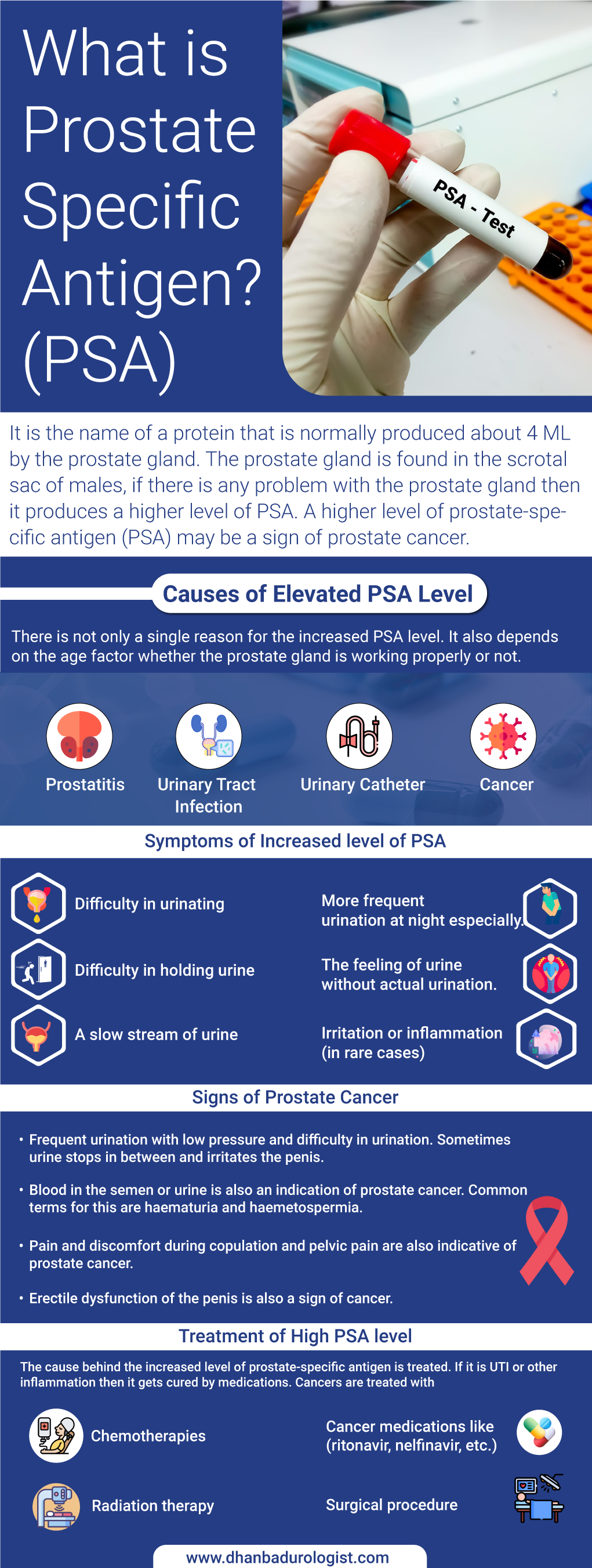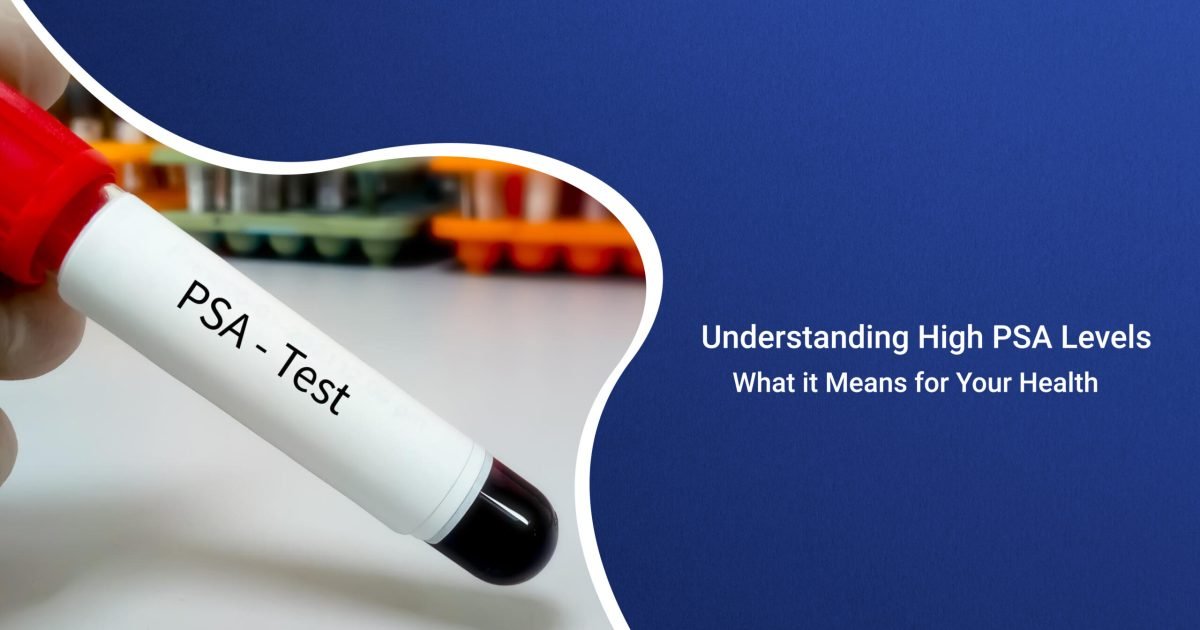PSA or prostate-specific antigen is the name of a protein that is produced by the prostate gland found in males. This is a health marker for normal prostate health, it is also a component of semen, in very small quantities.
Increased levels of PSA can cause cancerous growth in the prostate region. There are many reasons for increased levels of PSA but it is not a sign of a healthy body. The direct impact of increased prostrate is seen in reproductive health and anxiety problems in males.
What is PSA or Prostate Specific Antigen?
It is the name of a protein that is normally produced about 4 ML by the prostate gland. The prostate gland is found in the scrotal sac of males, if there is any problem with the prostate gland then it produces a higher level of PSA.
A higher level of prostate-specific antigen (PSA) may be a sign of prostate cancer. It is not only an increased level of PSA that confirms cancer in most cases, certain blood tests and other conformation techniques like biopsy are also done by Doctors.

Causes of Elevated PSA Level
There is not only a single reason for the increased PSA level. It also depends on the age factor whether the prostate gland is working properly or not. First of all, We will discuss the main reason behind this problem and later, mention small points to be noted.
1. Prostatitis
Prostatitis is a condition in which the prostate gland gets enlarged and causes the active synthesis of protein in the prostate gland. Mostly it is accompanied by inflammation and pain in the prostate gland.
Prostatitis may also be caused because of some viral and bacterial agent growth in the prostate gland. Viral inflammation results in more proteinaceous content in the PSA, but it is identified by culture test.
2. Urinary tract infection (UTI)
UTI is a common problem for both males and females but it is a panic problem. It is caused by the growth of microbes in the urinary tract. Severe infection can also result in an increased level of the PSA.
3. Urinary Catheter
It is the displacement of the urinary tube or loop that causes an increased level of PSA fluid. It is cured by operation of the tube and again placing that in the same place. Increased levels of PSA are also checked by medicines like 5-alpha reductase.
4. Cancer
Cancer may also be the reason for increased levels of the PSA or prostate-specific antigen. It can be confirmed with the help of biopsy and other imaging tests. If the level of PSA is more than 10, there are 50% chance of prostate cancer.
Symptoms of Increased level of PSA
There are merely physical symptoms, but if there is any cause of the above-mentioned problems then it can be detected easily. An individual with a high PSA level does have not to conclude any disease. Following are the symptoms of PSA high level:
- Difficulty in urinating.
- More frequent urination at night especially.
- Difficulty in holding urine.
- The feeling of urine without actual urination.
- A slow stream of urine
- Irritation or inflammation (in rare cases)
Signs of Prostate Cancer
A high level of PSA is not a direct indication of prostate cancer, usually, doctors take time to announce it as a cancer. After the test, it is confirmed, but there are some unusual signs that you can notice in case of a high PSA level.
- Frequent urination with low pressure and difficulty in urination. Sometimes urine stops in between and irritates the penis.
- Blood in the semen or urine is also an indication of prostate cancer. Common terms for this are haematuria and haemetospermia.
- Pain and discomfort during copulation and pelvic pain are also indicative of prostate cancer.
- Erectile dysfunction of the penis is also a sign of cancer.
Usually, these symptoms are seen with weight loss and pain in the bones. All the above-mentioned symptoms together can be a strong indication of prostate cancer. Fatigue and pain in the body are advanced prostate cancer symptoms if they are accompanied by other above-mentioned problems then, get a consultation from a doctor.
Prostate Specific Antigen Test
Mostly it is known from blood tests, other tests for PSA are Digital Rectal Exam (DRE) and prostate MRI. There are different purposes for doing DRE, and the dominant one is testing for Prostate Cancer.
DRE is done physically with the help of fingers performed by doctors. After lubrication in the rectal region than finger is inserted to examine the prostate gland from the rectum side. Any unusual bump and unusual texture denote prostrate cancer.
MRI is another method and in this procedure, images of prostate glands are observed. If there is any growth in the prostate tissues, it is examined through other methods. MRI is considered one of the safest evaluations of the internal organs to look at any unusual growth.
Other Tests:
Other tests include blood test and prostate biopsies which are done to confirm cancers. Transrectal ultrasound and blood tests are continued throughout the whole treatment. These are done when PSA levels keep increasing even after medication for common diseases like UTI.
Treatment of High PSA level
The cause behind the increased level of prostate-specific antigen is treated. If it is UTI or other inflammation then it gets cured by medications. Cancers are treated with:
- Chemotherapies.
- Cancer medications like ritonavir, nelfinavir, etc.
- Surgical procedure.
- Radiation therapy.
Common medicines for High levels of PSA are 5-alpha reductase, which cures enlarged prostate.
Conclusion
Prostate cancer is not a hectic situation, most of the time it can be cured and males with prostate cancer live a long life. If you are noticing such symptoms you need to consult it with a doctor. Cancer is a dreadful disease but modern medication has solution for every problem.
You need to be diagnosed at an early stage if you have such symptoms. Dr. Saket Narnoli is a specialist and healthcare provider for complicated diseases like PSA, consult him if you have such symptoms.






